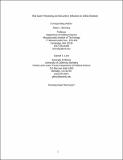Red Scare? Revisiting Joe McCarthy's Influence on 1950s Elections
Author(s)
Lenz, G. S.; Berinsky, Adam
DownloadBerinsky_Red scare.pdf (473.9Kb)
OPEN_ACCESS_POLICY
Open Access Policy
Creative Commons Attribution-Noncommercial-Share Alike
Terms of use
Metadata
Show full item recordAbstract
In the early 1950s, politicians apparently allowed themselves to be spectators to the anticommunist witch hunt of Senator Joe McCarthy and his supporters, leading to a particularly grim chapter in American politics. In part, they did so because they thought the public supported McCarthy. Although politicians lacked contemporary public opinion data, they apparently inferred McCarthy’s support from key Senate race outcomes. The few senators who initially stood up to McCarthy lost their reelections when McCarthy campaigned against them. In this article, we revisit the case of McCarthy’s influence and investigate whether politicians fundamentally misinterpreted support for McCarthy. Using county- and state-level election data from across the twentieth century, we develop plausible counterfactual measures of normal electoral support to assess McCarthy’s influence on electoral outcomes. We adopt a variety of analytic strategies that lead to a single conclusion: There is little evidence that McCarthy’s attacks mattered to the election outcomes. Our results imply that politicians can greatly err when interpreting the meaning of elections, and point to the importance of research on elections to help prevent such errors.
Date issued
2014-07Department
Massachusetts Institute of Technology. Department of Political ScienceJournal
Public Opinion Quarterly
Publisher
Oxford University Press
Citation
Berinsky, A. J., and G. S. Lenz. “Red Scare? Revisiting Joe McCarthy’s Influence on 1950s Elections.” Public Opinion Quarterly 78.2 (2014): 369–391.
Version: Original manuscript
ISSN
0033-362X
1537-5331